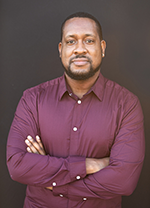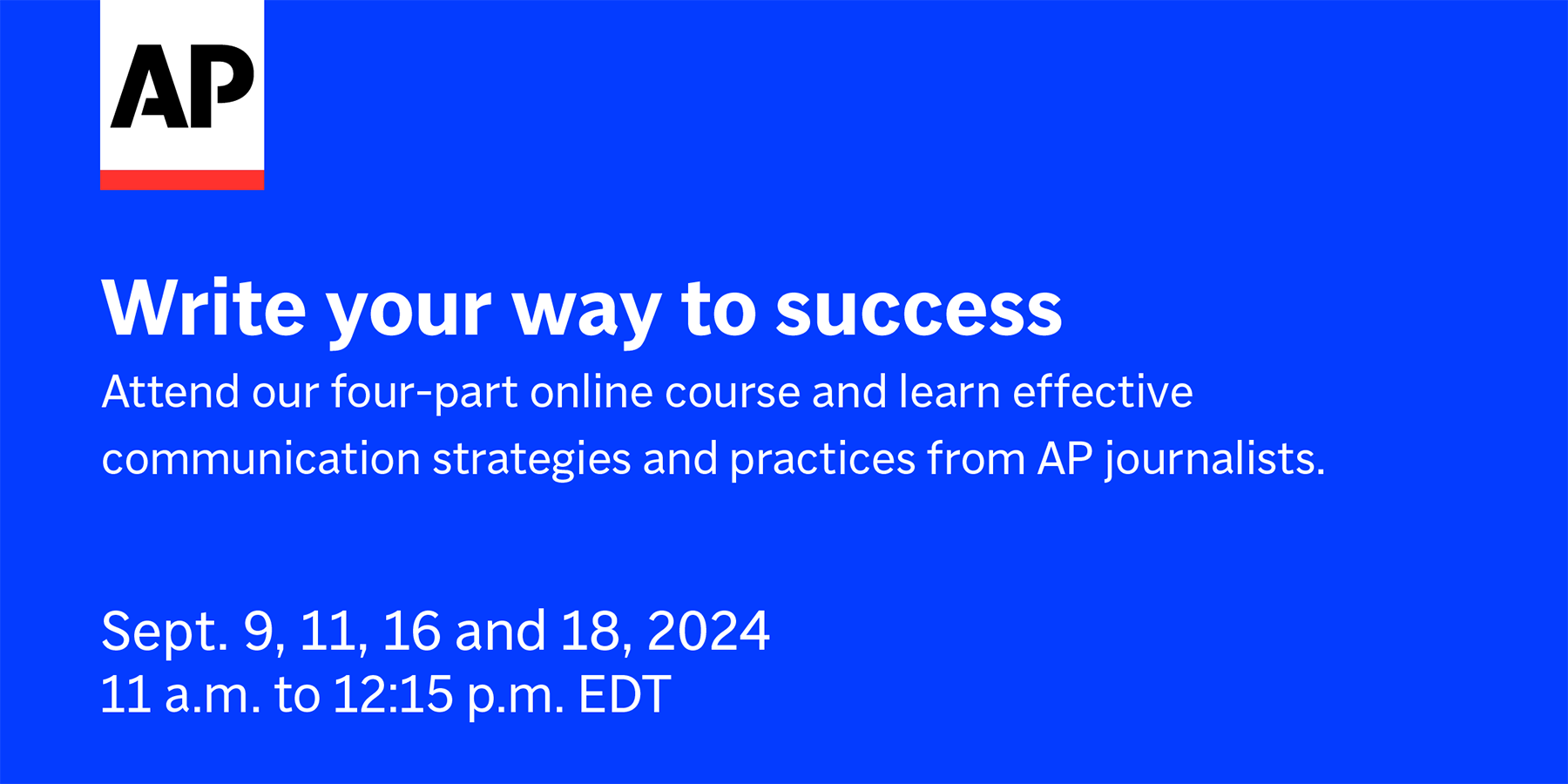Write Your Way To Success - On Demand
— Access to writing guides and tip sheets for effective writing.
— Q&A sessions with AP editors.
— Keep access to Write Your Way to Success On Demand content through April 30, 2026.
— The Write Your Way to Success Workshop On Demand is offered in partnership with Edmaker, experts in online learning communities.
— Edmaker hosts the course on its web-based platform. There's nothing to download or install, but you will need a current browser and reliable internet connectivity.
— After you register for the Write Your Way to Success Workshop On Demand on the Stylebook website, you will receive a claim code via email. When you redeem that code via the link included in the email, you will get an email from Edmaker to access the online workshop.
— If you sign up on behalf of multiple users, you will get an email with a set of claim codes. Share one code with each user who you would like to participate, along with the activation code link. As your users redeem their claim codes, they will get their activation emails from Edmaker.
— EdMaker works best when you have JavaScript and cookies enabled. Flash and other plugins are not required.
Group Rate Packages
— 3 to 4 registrants: 10% off per user
— 5 to 10 registrants: 15% off per user
— 11 to 20 registrants: 20% off per user
— 21+ registrants: 25% off per user
 Ted Anthony, director of new storytelling and newsroom innovation for The Associated Press, currently oversees AP's Trends + Culture coverage globally. He is a veteran correspondent and news leader who has been with AP since 1992. He has served in a variety of roles both in the field and at AP headquarters, ranging from national correspondent to China news editor to director of Asia-Pacific news. In 2003, he reopened AP's Baghdad bureau in the days after the U.S. invasion. For 30 years, he has specialized in writing about American and global culture and how it changes and evolves. He has covered stories from the aftermath of 9/11 in Pakistan, Afghanistan and Iraq to presidential elections, the 1997 death of Princess Diana in London and seven Olympic Games. He is the author of the 2007 book "Chasing the Rising Sun: The Journey of an American Song," and is currently at work on his next book, "Unsorted But Significant: Travels Through Dementia, Grief and the Things Parents Leave Behind."
Ted Anthony, director of new storytelling and newsroom innovation for The Associated Press, currently oversees AP's Trends + Culture coverage globally. He is a veteran correspondent and news leader who has been with AP since 1992. He has served in a variety of roles both in the field and at AP headquarters, ranging from national correspondent to China news editor to director of Asia-Pacific news. In 2003, he reopened AP's Baghdad bureau in the days after the U.S. invasion. For 30 years, he has specialized in writing about American and global culture and how it changes and evolves. He has covered stories from the aftermath of 9/11 in Pakistan, Afghanistan and Iraq to presidential elections, the 1997 death of Princess Diana in London and seven Olympic Games. He is the author of the 2007 book "Chasing the Rising Sun: The Journey of an American Song," and is currently at work on his next book, "Unsorted But Significant: Travels Through Dementia, Grief and the Things Parents Leave Behind."
 Anna Jo Bratton, enterprise editor for The Associated Press, works with colleagues across the world to produce high-impact journalism. Her focus is long-form narrative editing, and coordinating multiformat teams for ambitious projects. She has been with the AP for 15 years in various reporting and editing roles, and a member of the AP Stylebook team for more than 10. Bratton's first newspaper job was an obituary clerk at the Lincoln Journal Star in Nebraska. After working at newspapers in St. Louis and Des Moines, Iowa, Bratton joined the AP in Omaha, Nebraska, in 2007. She earned a bachelor's degree from the University of Nebraska-Lincoln in 2003.
Anna Jo Bratton, enterprise editor for The Associated Press, works with colleagues across the world to produce high-impact journalism. Her focus is long-form narrative editing, and coordinating multiformat teams for ambitious projects. She has been with the AP for 15 years in various reporting and editing roles, and a member of the AP Stylebook team for more than 10. Bratton's first newspaper job was an obituary clerk at the Lincoln Journal Star in Nebraska. After working at newspapers in St. Louis and Des Moines, Iowa, Bratton joined the AP in Omaha, Nebraska, in 2007. She earned a bachelor's degree from the University of Nebraska-Lincoln in 2003.
 Aaron Morrison, race and ethnicity news editor for The Associated Press, joined AP in 2020 as a national writer on the R&E team, and has reported extensively on the intersection of race, justice and culture. In Fall 2021, Aaron also became an adjunct lecturer in the Craig Newmark Graduate School of Journalism at the City University of New York. Aaron's work has previously appeared in outlets such as The Appeal, Mic and The Record of Bergen County. He lives in Brooklyn, New York, with his wife and their newborn daughter.
Aaron Morrison, race and ethnicity news editor for The Associated Press, joined AP in 2020 as a national writer on the R&E team, and has reported extensively on the intersection of race, justice and culture. In Fall 2021, Aaron also became an adjunct lecturer in the Craig Newmark Graduate School of Journalism at the City University of New York. Aaron's work has previously appeared in outlets such as The Appeal, Mic and The Record of Bergen County. He lives in Brooklyn, New York, with his wife and their newborn daughter.
 Mallika Sen, news editor for entertainment for The Associated Press, helps direct global arts, culture, lifestyles and entertainment coverage, and occasionally covering an Olympics. She previously edited and covered breaking news and enterprise in the northeast U.S., having begun her AP career in the South. A Los Angeles native, she's a graduate of Georgetown University's School of Foreign Service.
Mallika Sen, news editor for entertainment for The Associated Press, helps direct global arts, culture, lifestyles and entertainment coverage, and occasionally covering an Olympics. She previously edited and covered breaking news and enterprise in the northeast U.S., having begun her AP career in the South. A Los Angeles native, she's a graduate of Georgetown University's School of Foreign Service.
 Michael Giarrusso, vice president of news strategy for The Associated Press, oversees teams covering Sports, Entertainment, Health and Science, Business and Religion coverage. Giarrusso has worked for the AP since 1992 as a sportswriter, editor, bureau chief, regional director, and global sports director before becoming Deputy Head of News Gathering in 2021. He is a graduate of the University of Georgia's Henry Grady College of Journalism and Mass Communication.
Michael Giarrusso, vice president of news strategy for The Associated Press, oversees teams covering Sports, Entertainment, Health and Science, Business and Religion coverage. Giarrusso has worked for the AP since 1992 as a sportswriter, editor, bureau chief, regional director, and global sports director before becoming Deputy Head of News Gathering in 2021. He is a graduate of the University of Georgia's Henry Grady College of Journalism and Mass Communication.
Syllabus:
Session 1: How effective writing has changed the world
In this session, you'll:
- Be introduced to what this course will be and why it matters to you — and why some things about writing might not be what you expect.
- Learn about a brief history of writing as communication, as art, as persuasive argument.
- Review some of AP’s top accomplishments in the writing and storytelling space.
- Come to understand how writing can change things — from freeing slaves in Southeast Asia to causing the end of a presidency.
- Examine the more intimate ways writing changes things: How can delivering facts help clear the fog? How can expertise and perspective prevent people from misinterpreting big events? How can writing inspire and move people? How is journalism the “first rough draft of history” – and what can the full version of that quote tell us?
- Be given examples of effective writing that you might not expect – things that aren’t journalism but are deeply impactful. Poetry. Advertising.
- Learn about speeches (Kennedy inaugural, e.g.). Turns of phrase that have stuck with people through the decades.
- See how this all ties into what you want to accomplish, and pivot into the coming sessions.
Featured Speaker: Anna Jo Bratton, AP Stylebook editor, The Associated Press
Session 2: Principles of journalism and writing and how they relate to you
In this session, you'll learn:
- Why journalism is a good model for overall communication, no matter the industry.
- How journalism in its modern form came to be.
- How the pursuit of, and the myth of, objectivity has shaped both journalism and the larger world. Why eliminating bias still matters, and how fairness plays a role in shaping journalism. What roles standards and ethics have in any nonfiction writing endeavor.
- AP's background in all this and how its history is threaded through with the history of facts and journalism and effective communication.
- How learning journalism principles and practices can help YOU succeed.
- How good writing can be everywhere — even places you don’t expect.
Featured Speaker: Aaron Morrison, race and ethnicity news editor, The Associated Press
Session 3: Reporting/research, writing and editing to make you a better communicator
In this session, you'll learn:
WRITING
- A history of good writers – and why they were good.
- Why any writing is only as good as the thought and research behind it — and how to make that happen.
- How to think about writing before DOING writing.
- Things to do before you begin: a breakdown and task list.
- How to put facts together in the most effective ways.
- What we mean when we say, "write not only to be understood, but not to be misunderstood."
EDITING
- Basic principles of editing.
- Editing the idea/"the coaching model." Why you should use it whenever you can.
- Different types of edits, from the content edit to bulletproofing to the word choice/substitution edit and beyond. How you can calibrate these to your subject matter and assignment.
- How to develop an editing relationship with your writers (and their egos).
- How to be disciplined: Self-editing and its role in the process.
Featured Speaker: Mallika Sen, entertainment news editor, The Associated Press
Session 4: Crafting a story and packaging it for readers
In this session, you'll learn:
- How without reporting, there is no writing. Or: Writing begins in the idea phase.
- How to write a lede and why it matters more than anything else in the story.
- How to add context.
- Story structures and choosing them consciously based on audience and what you want to achieve with the piece of writing.
- Storytelling on deadline and how that's different — and how you can write faster than you ever believed.
- The process of one story from conception to delivery and how to extract the principles that you can use. Those principles will be presented as takeaways.
Featured speaker: Michael Giarrusso, vice president news strategy, The Associated Press
Cart
Cart is Empty
- View cart
- Total: $0.00
Need a quote?
You can get a price quote by adding your products to the shopping cart and clicking the "Request Price Quote" button in the right column. That will allow you to create an email with the price quote information that includes a PDF of the quote that you can use to place the order.
CREATE YOUR CUSTOMER PROFILE
If you don't have an account yet, register now. It's quick and easy, and once we verify that you qualify for discounted pricing, you'll get that price every time you log in.
Forgot your username or password? Get help logging in.
Have a question about whether you qualify for a discount? Read more on our help center.
Sign up for our newsletter
Keep up to date on style news. Sign up for our stylish monthly e-newsletter by submitting your email address below.
Additional Resources
Add the publications cited in the AP Stylebook bibliography to your library.
View listCompare Products
Compare our products to determine the best fit for you.
Compare

